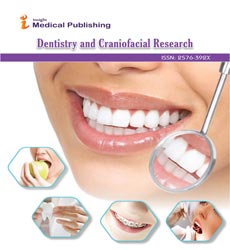ISSN : 2576-392X
Dentistry and Craniofacial Research
The whitening and abrasion effect of bentonite on human tooth enamel
Abstract
Aim: In recent decades, there has been increasing attention towards clays due to their unique properties, as we see them in numerous medical and dental products. Bentonite is an absorbent swelling clay used in many cultures as a natural remedy and has relatively low abrasive properties. This study investigates the whitening effects of bentonite on human tooth enamel.
Materials and Methods: Fifty human tooth specimens were obtained from recently extracted caries-free wisdom teeth, disinfected, polished, and randomly divided into five study groups consisting of bentonite (0.5 and 1.5 and 3 weight percentage), positive control (Close-up Icy White toothpaste) and negative control. A stained film was slowly deposited on specimens using tea and coffee and subsequently removed using a mechanical brushing procedure with toothpaste slurries. The roughness (Ra) and CIELAB colour space (ïÂ?ïÂ?) were measured before and after the specimens were submitted to procedures. The data were submitted to one-way ANOVA and Tukey's HSD test (α=0.05).
Results: There were no statistically significant differences in colour alterations after one year equivalent of tooth brushing between five study groups (P>0.05). The positive control group had the most changes in Ra value (P<0.05). Conclusion: In contrast to previous studies, this study shows that bentonite did not significantly affect teeth whitening. Also, bentonite had relatively low abrasiveness. Further studies seem to be required.
Open Access Journals
- Aquaculture & Veterinary Science
- Chemistry & Chemical Sciences
- Clinical Sciences
- Engineering
- General Science
- Genetics & Molecular Biology
- Health Care & Nursing
- Immunology & Microbiology
- Materials Science
- Mathematics & Physics
- Medical Sciences
- Neurology & Psychiatry
- Oncology & Cancer Science
- Pharmaceutical Sciences
